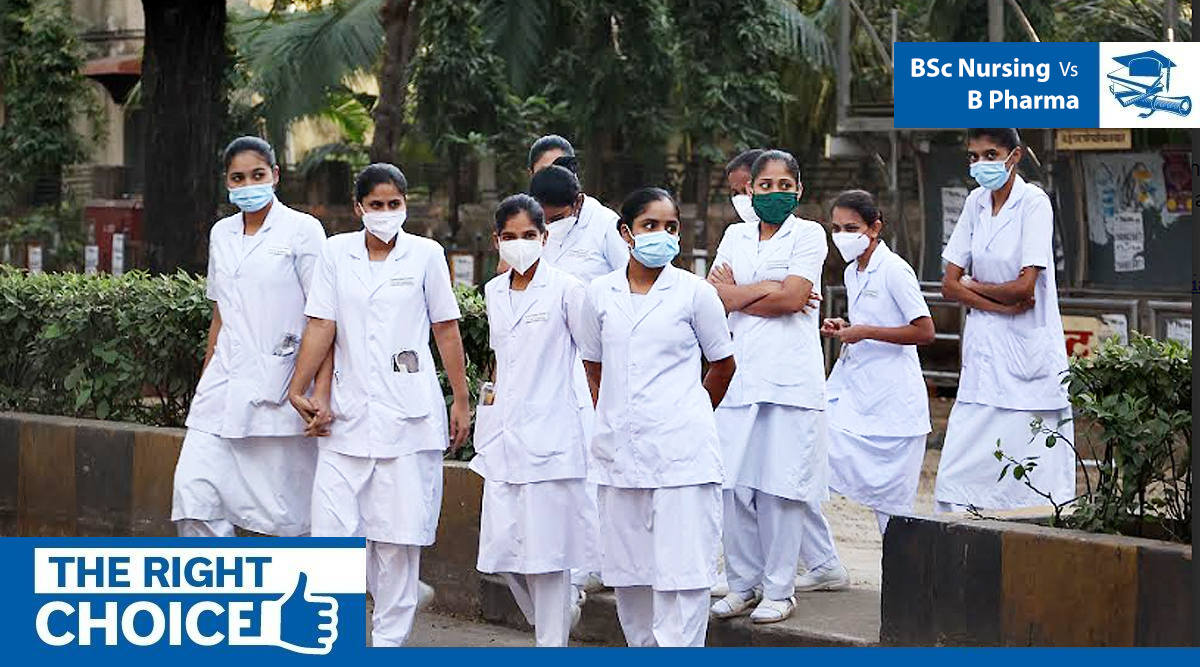(The Right Choice’ is a series by The Indian Express that addresses common questions, misconceptions, and doubts surrounding undergraduate admissions. You can read the stories here.)
Students interested in the medical stream often debate between choosing the Bachelor of Science in Nursing (BSc Nursing) programme or the Bachelor in Pharmacy (B Pharma) – two popular courses in the field. An overview of their eligibility criteria, syllabi, structures and the job opportunities they provide.
B.Sc Nursing is a four-year undergraduate programme focused on knowledge and skills pertaining to the nursing field. It equips students for patient care.
B. Pharma is a four-year undergraduate programme, which trains students to manufacture and dispense drugs.
“While B.Sc. Nursing students work with patients who are in need, B.Pharmacy students are well-versed with drug development,” said Lakshmamma Tadakara, principal of the GITAM school of nursing at GITAM (Deemed to be) University.
Eligibility
For the B.Sc nursing course, aspirants should have a 10 plus 2 or equivalent qualification in the science stream with English, Physics, Chemistry, and Biology as compulsory subjects. For B.Pharma, candidates are expected to have English, Physics or Biology, Chemistry, and Mathematics as compulsory subjects, along with the 10 plus 2 or equivalent qualification.
Course Structures
Topics in the B.Sc Nursing curriculum include: English, anatomy, physiology, nutrition, biochemistry, nursing foundation, psychology, introduction to computers, sociology, pharmacology, pathology, genetics, medical surgical nursing, community health nursing, microbiology, environment science, child health nursing, mental health nursing, communicational and educational technology, midwifery and obstetrical nursing, nursing research and management of nursing service and education.
Human anatomy and physiology, pathophysiology, biochemistry, pharmaceutical microbiology, pharmacology, pharmacy practice and clinical pharmacology, pharmaceutical analysis, pharmaceutical chemistry, pharmacognosy, pharmaceutics, biotechnology, pharmaceutics jurisprudence and ethics, industrial pharmacy, pharmaceutical industrial management, remedial mathematics or biology, basic computer applications, communication skills, and environmental science are the core courses in the B.Pharma course.
Job opportunities
Students with the B.Sc. Nursing degree can become medical coders, medical writers, clinical researchers, alongside becoming a nurse in government and private hospitals, nursing homes, clinics and health departments. They can also choose to work as a nurse abroad, and each country has their own tests and selection procedure for the same.
B. Pharmacy students can work as pharmacists in government and private hospitals, clinics and health departments. Additionally, they can also be a drug inspector, chemist or druggist, and a quality control and manufacturing chemist. The course provides the opportunity to open an own manufacturing unit as well.
Speaking of the demand in the field, Tadakara said, “The demand for B.Pharma-related jobs has increased since Covid-19, and thus, students are also showing more interest in it now,”.
How to make the final choice?
The two programmes have different curriculums and provide different skill sets. Hence, the aspirants cannot switch when it comes to job opportunities. The choice, therefore, comes largely down to their interest.
Navneet Khurana, coordinator of the school of pharmaceutical sciences at Lovely Professional University (LPU) said, “B.Sc. Nursing candidates have different knowledge and skill-sets that they acquire during the programme when compared to B.Pharm candidates. Therefore, the majority of jobs they wish to take up do not overlap.
‘B.Sc. Nursing is about patient-care, the student should pick the programme only if he/she is interested in bedside patient care. If the student is more interested in manufacturing and dispensing drugs, they can go for the B. Pharm programme,” Dr Khurana added.
!function(f,b,e,v,n,t,s)
{if(f.fbq)return;n=f.fbq=function(){n.callMethod?
n.callMethod.apply(n,arguments):n.queue.push(arguments)};
if(!f._fbq)f._fbq=n;n.push=n;n.loaded=!0;n.version=’2.0′;
n.queue=[];t=b.createElement(e);t.async=!0;
t.src=v;s=b.getElementsByTagName(e)[0];
s.parentNode.insertBefore(t,s)}(window, document,’script’,
‘https://connect.facebook.net/en_US/fbevents.js’);
fbq(‘init’, ‘444470064056909’);
fbq(‘track’, ‘PageView’);






